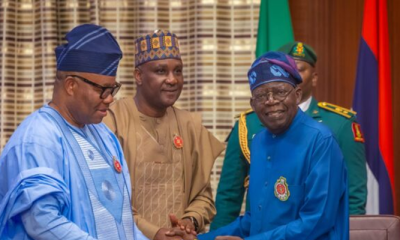OPINION
Urging Tinubu To Bridge The Gap Between Promises And Performance To Deliver Real Change

BY ISAAC ASABOR
In the heat of the political season leading up to the 2023 presidential elections, Nigerians heard endless promises from the then-candidate Bola Ahmed Tinubu. Pledges were made to tackle poverty, improve infrastructure, reduce inflation, create jobs, and alleviate the economic hardship plaguing millions of citizens. Now, several months into his administration, it is time to assess whether these promises are being translated into tangible outcomes or if they remain mere rhetoric.
While no one expects miracles overnight, the Nigerian populace is growing increasingly impatient. The reality is stark: the cost of living has skyrocketed, unemployment is still alarmingly high, and essential commodities are becoming luxuries beyond the reach of the average Nigerian. In this light, President Tinubu and his team must focus on bridging the widening gap between their lofty campaign promises and the harsh realities Nigerians are currently experiencing.
A significant issue that has characterized the early days of Tinubu’s administration is the insistence by his supporters that the challenges the country is currently facing are simply a continuation of issues left behind by previous governments. While it is true that the Tinubu administration inherited a heavy burden, this excuse is quickly wearing thin among the masses.
The narrative that the economic hardships, rising inflation, and unemployment rates are all the consequences of previous mismanagement is becoming less persuasive as the days go by. Leadership is about taking responsibility, and as the elected leader, Tinubu must own the problems on the ground and seek immediate solutions rather than deflecting blame. After all, he was voted in to bring about change, not to continue the cycle of excuses.
The citizens who cast their ballots in favour of Tinubu did so with the belief that he had the capacity and political will to steer Nigeria toward prosperity. His administration must recognize that, at some point, the finger-pointing must stop, and the focus must shift to delivering on those promises that convinced millions of Nigerians to entrust him with the nation’s leadership.
One of the critical pitfalls that Tinubu’s administration seems to be struggling with is the tendency toward patronage appointments. Since assuming office, there have been concerns that many of the appointments made so far have been based more on political loyalty than on merit. While it is understandable that a leader would want trusted allies in key positions, this approach often leads to inefficiency, mismanagement, and policies that fail to yield the desired results.
The consequences of prioritizing loyalty over competence are already becoming evident in the administration’s performance. Many Nigerians are beginning to question whether some of the appointees have the necessary skills and expertise to deliver on the ambitious promises made during the campaign. For Tinubu to achieve his vision of economic recovery and national progress, he must prioritize competence and experience in his appointments.
Patronage politics may secure the loyalty of political allies, but it is detrimental to effective governance. If the goal is to revamp the economy, improve social welfare, and create opportunities for Nigerians, then it is essential to have the right people in the right positions. Tinubu needs to recognize that these appointments are not just political rewards but critical decisions that will determine the trajectory of his administration.
One area where the Tinubu administration has made bold moves is in economic reforms. The removal of fuel subsidies, for instance, was a significant policy change intended to curb fiscal leakages and redirect funds toward development projects. However, the impact on the ground has been mixed, with fuel prices soaring and the cost of transportation becoming nearly unbearable for the average Nigerian.
While these economic policies might have been designed with good intentions, the government has not done enough to cushion the adverse effects on the masses. For instance, despite the talk of palliatives to ease the burden, many Nigerians are still struggling to put food on the table. The distribution of these palliatives has been inconsistent, and there are concerns that they are not reaching those who need them the most.
Tinubu’s administration must be more deliberate in its approach to implementing policies that directly affect the livelihoods of citizens. It is not enough to announce reforms or initiatives; there must be a clear and effective strategy to ensure that these policies translate into real benefits for the people. This includes making sure that palliative measures are adequately funded, well-coordinated, and reach the intended beneficiaries without the usual bureaucratic bottlenecks and corruption that often plague such initiatives.
Another area where the administration needs to step up is in ensuring that its actions speak louder than words. Nigerians are tired of grandstanding and lofty speeches. The people want to see real changes — in their pockets, in their homes, in their businesses, and on the streets. The administration must go beyond the optics of ribbon-cutting ceremonies and public declarations of progress.
It is time for Tinubu to roll up his sleeves and get to work on delivering measurable outcomes. This requires not just announcing policies but also diligently monitoring their implementation to ensure that they are achieving the desired objectives. There is a clear disconnect between the administration’s claims of economic progress and the lived experiences of everyday Nigerians. The sooner Tinubu’s team addresses this disconnect, the sooner they can regain the trust of the people.
Tinubu’s supporters also have a crucial role to play. Rather than dismissing critics as enemies of progress or blindly defending every action of the administration, it would be more productive for them to offer constructive criticism. Loyal supporters should hold the administration accountable by providing honest feedback, highlighting areas where the government is falling short, and suggesting improvements.
It is only through constructive dialogue and a willingness to accept criticism that Tinubu’s administration can improve its performance and better serve the people who entrusted them with power. Blind loyalty, on the other hand, only serves to perpetuate inefficiency and prevent meaningful progress. Tinubu’s team should welcome diverse perspectives, especially from those who genuinely want to see Nigeria succeed.
As the dust settles on the first few months of Tinubu’s presidency, the honeymoon period is decidedly over. The expectations of Nigerians remain high, and the administration must recognize that it is running out of time to deliver on its promises. It is no longer sufficient to blame previous administrations or hide behind political rhetoric. Tinubu must take decisive action to bridge the gap between his promises and his performance.
This will require assembling a competent team, prioritizing policies that directly benefit the masses, and taking a results-driven approach to governance. The time for patronage appointments and half-hearted reforms is over. If Tinubu wants to leave behind a lasting legacy, he must focus on tangible results that improve the quality of life for all Nigerians, not just his inner circle or political allies.
In the final analysis, history will judge Tinubu not by the promises he made but by the results he delivered. The ball is firmly in his court to demonstrate that he is the leader capable of turning Nigeria’s fortunes around. For the sake of the millions of Nigerians who are looking to his administration for relief, he must act swiftly, decisively, and strategically. The window for excuses is rapidly closing, and the time for action is now.
-
CRIME3 years ago
PSC Dismisses DCP Abba Kyari, To Be Prosecuted Over Alleged $1.1m Fraud
-
FEATURED3 years ago
2022 Will Brighten Possibility Of Osinbajo Presidency, Says TPP
-
FEATURED2 years ago
Buhari’s Ministers, CEOs Should Be Held Accountable Along With Emefiele, Says Timi Frank
-
BUSINESS & ECONOMY1 year ago
Oyedemi Reigns As 2023’s Real Estate Humanitarian Of The Year
-
SPORTS1 year ago
BREAKING: Jürgen Klopp Quits Liverpool As Manager At End Of Season
-
SPORTS2 years ago
Could Liverpool Afford Kylian Mbappe For €200 million? Wages, Transfer Fee
-
ENTERTAINMENT2 years ago
Veteran Nigerian Musician, Basil Akalonu Dies At 72
-
FEATURED2 years ago
Tribunal Judgement: Peter Obi Warns Of Vanishing Electoral Jurisprudence, Heads To Supreme Court
-
BUSINESS & ECONOMY2 years ago
Oyedemi Bags ‘Next Bulls Award’ As BusinessDay Celebrates Top 25 CEOs/ Business Leaders
-
FEATURED3 years ago
2023 Presidency: South East PDP Aspirants Unite, Demand Party Ticket For Zone



































